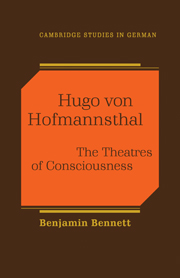Book contents
- Frontmatter
- Contents
- Preface
- Acknowledgments
- List of Abbreviations
- Part I Principles of lyric and drama
- Part II Language and society
- Part III Culture and collapse
- 13 Art by accident
- 14 The allomatic
- 15 The rôle of “Vorwitz” in Das Salzburger Groβe Welttheater
- 16 Salzburg as a theater
- 17 Goethe, Nietzsche, Thomas Taylor and Der Turm
- 18 A tower in ruins: the tragedy of a tragedy
- Conclusion
- Notes
- Index of works
- General index
- Frontmatter
- Contents
- Preface
- Acknowledgments
- List of Abbreviations
- Part I Principles of lyric and drama
- Part II Language and society
- Part III Culture and collapse
- 13 Art by accident
- 14 The allomatic
- 15 The rôle of “Vorwitz” in Das Salzburger Groβe Welttheater
- 16 Salzburg as a theater
- 17 Goethe, Nietzsche, Thomas Taylor and Der Turm
- 18 A tower in ruins: the tragedy of a tragedy
- Conclusion
- Notes
- Index of works
- General index
Summary
Before we go on to the festival plays and the final phase of Hofmannsthal's career, we need to anticipate some of the problems we will encounter, and some complications that arise from problems already discussed. The concept of the “allomatic” is useful for this purpose. Especially the problem of truth, and of the speaking or formulation of truth – which arises with the metaphysical aspect of the operas considered as a renewal of “lyric” – will occupy our attention, as will the novel Andreas, which otherwise escapes our focus upon the dramatic.
Although the word “allomatisch” occurs only five times in as much of Hofmannsthal as has yet been published, twice close together in “Ad me ipsum” (A 218), twice in the notes to Andreas (W30 102, 105; E 243), and once in connection with another narrative project (W29 195), the concept has attracted a good deal of critical attention. But Hofmannsthal never actually defines the word, and critics tend to use it rather freely, in support of this or that argument from which they derive a tailor-made definition. The concept is too important to be treated in this manner.
Manfred Pape has shown that Hofmannsthal's source for the word “allomatic” is a curious Rosicrucian–alchemical book by Ferdinand Maack entitled Zweimal gestorben! (1912). But in his discussion of this source, Pape begins with an assumption that he ought by rights to be testing, that the allomatic is principally a force acting upon the individual, that the individual stands in a passive relation to it, that it is definable as “being transformed by another” (Pape, p. 680).
- Type
- Chapter
- Information
- Hugo von HofmannsthalThe Theaters of Consciousness, pp. 252 - 268Publisher: Cambridge University PressPrint publication year: 1988



